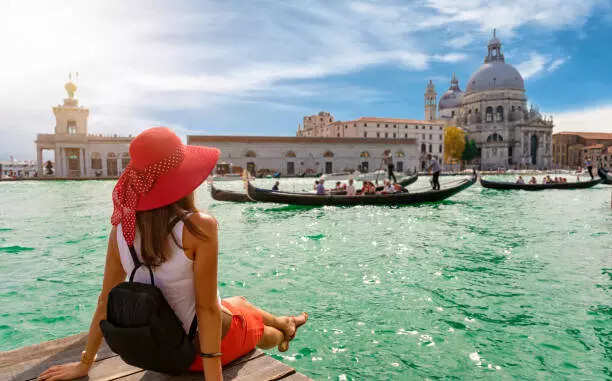
“Spas are so 2010!”
A guest recently told me and I couldn’t agree more.
Today, wellness isn’t an add-on anymore, it’s the main course! A full-on emotional, mental, and physical smorgasbord.
“Forget cucumber facials, give us mindful mixology classes, early morning walks in nature, and sunrise Yin Yoga with goats,” a guest once told me.
A recent research by The Global Wellness Institute proves that “Wellness Went Viral Post-Pandemic.” In 2022, the global wellness economy was valued at $5.6 trillion dollars, 14 per cent higher than before the pandemic took the world by storm.
What do the numbers say?
●819.4 million wellness trips in 2022, nearly double pre-pandemic levels! (Think of a global yoga class with everyone from Paris to Patagonia.)
●Wellness trips represent 18.7 per cent of all tourism spending, meaning 1 in 5 travel dollars are now fueling well-being adventures. (Forget souvenirs, everyone’s buying meditation mantras and matcha smoothies.)
●Global wellness economy to grow at a phenomenal 8.6 per cent annually for the next 5 years.
●Wellness will top $6.3 trillion in 2023 and skyrocket to a staggering $8.5 trillion by 2027!
Here comes India into play!
A nation rooted in holistic wellness with its eras-old wellness systems and practices including Ayurveda, Yoga, plant-based satvik diets, zero-waste & sustainable farming, and spirituality-embedded spirituality retreats.
A slew of factors coupled together are contributing to India grabbing a larger pie in the overall growth of wellness tourism. The Asia-Pacific region including India marked a 107 per cent of 2019 recovery in wellness tourism.
1. Post-Pandemic Hangover
In the wake of the retracting pandemic, the world embraced the crucial role of wellness tourism and how it can immensely help their overall well-being, triggering a 180-degree transformation in people’s attitude towards personal well-being.
2. Rising Work Stress
65 per cent of working professionals struggle at work due to stress, and 47 per cent fear mental health repercussions- A recent global study by ADP found, the numbers clearly indicate a severely stressed-out workforce.
Thus, more and more working professionals are turning to wellness tourism as a mode of rejuvenation and responsible exploration to revitalize and unwind. Millennials aren’t just traveling for wellness – they’re craving it.
This generation tackles wellness tourism with a unique mindset, blending relaxation cravings with adventurous desires. Their inner journey isn’t just about spa days, it’s about escaping the daily grind and finding deep emotional fulfillment. Studies confirm this, showing Millennials seek stress relief and inner happiness through diverse, novel experiences. So, forget cookie-cutter wellness packages – Millennials want fresh adventures that soothe the soul and invigorate the spirit.
3. The 2Ds of Rising Income
Gen Zs and Millennials have a considerable disposable and discretionary income they’re willing to spend on wellness experiences with long-term health benefits.
The importance of achieving physical and mental well-being during yoga, rejuvenation treatment, herbal medicines, meditation, agritourism, and spa therapies at exotic locations.
4. Race To The Immunity Halo!
People woke up to the importance of a healthy body and strong immunity, all thanks to the havoc caused by the Covid-19 pandemic. Further, the definition of immunity and wellness has extended to include intellectual wellness, hormonal wellness, facial wellness, sexual wellness, etc.
Simultaneously, the hospitality industry is keeping up with the rising demand for exclusive programs curated to rejuvenate their inner Everest. Recently, we at Ayatana shook hands with a celebrity wellness ambassador, Anshuka Parwani, to provide our guests with a transformative journey toward achieving inner balance and overall well-being.
Adults are chasing an immunity halo! A recent survey of 16,000 adults revealed a global obsession with immune health. A whopping 65 per cent are actively boosting their defenses with vitamins, wellness retreats, botanicals, and conscious food choices. In a world grappling with uncertainty, immunity has become the ultimate status symbol – the new six-pack.
5. Rising Awareness About The Power of Healing With Nature
A rising recognition of environmental factors shaping health extends from our homes to workplaces, communities, and travel. Wellness now extends far beyond the realms of hospitality and recreation, gaining traction among diverse stakeholders such as employers, schools, public health, and urban planning. This expanding embrace signals a broader movement, with these stakeholders poised to propel wellness initiatives to the masses, amplifying their impact on collective well-being. The changing narrative underscores a paradigm shift towards holistic health consciousness.
Aging populations, chronic disease epidemics, and skyrocketing healthcare costs are stark reminders: we need wellness more than ever. Expanding awareness of healthy habits and mindfulness practices fuels a revolution – from sick care to self-care.
Wellness tourism converges the burgeoning tourism and wellness sectors, with India’s wellness market valued at INR 490 bn, with services accounting for 40 per cent. The rejuvenation segment sees a notable surge, estimated at INR 4-5 bn. Mirroring global trends, Bollywood celebrities are catalyzing aspirational demand for spa services, echoing the influence seen in international markets. This confluence signifies a robust growth trajectory at the intersection of travel and well-being in India.
The urban population, comprising 28 per cent in 2001, is projected to surge to 37 per cent by 2025, fueling a dual impact of heightened availability and awareness of wellness products alongside a rise in stress-related disorders. The urbanization wave propels growth in both enhancement and curative wellness products and services, spurred by peer pressure and a societal focus on appearance. Increasing health consciousness, exposure to global beauty trends, and widespread media influence contribute to the expanding wellness landscape.
The author is the Founder & MD of Ayatana Hospitality.
DISCLAIMER: The views expressed are solely of the author and ETTravelWorld.com does not necessarily subscribe to it. ETTravelWorld.com shall not be responsible for any damage caused to any person/organisation directly or indirectly.
[ad_2]
Source link

The global hospitality industry has undergone a tremendous shift towards growing and operating sustainability. Responsible tourism is taking centre stage, with travellers increasingly seeking eco-friendly accommodations and experiences that have a positive impact on the planet and local communities. As the hospitality industry acknowledges the urgent need to address environmental and social challenges, sustainable tourism has become a critical component of our journey towards a better future.
The evolution of travellers: Driving change through conscious choices
Travellers have evolved into conscious consumers who prioritise sustainability in their choices. The modern globetrotter seeks to align their travel experiences with eco-friendly values, from reducing carbon footprints to preserving cultural heritage. A global study commissioned by IHG Hotels & Resorts revealed that 83 per cent of consumers noted the importance of choosing a hotel brand that operates responsibly, with guests willing to spend on average 31 per cent more on accommodation that meets this need. With the growing appetite for more eco-friendly stays, search engines and OTAs are now highlighting a hotel’s credentials, with Google labelling hotels meeting its sustainability criteria as Eco-certified, while Booking.com applies its Travel Sustainable badge.
Our efforts to create a sustainable future
The global hospitality industry has been actively responding to the changing consumer mindset for sustainable tourism by spearheading various initiatives and practices from energy-efficient technologies to waste reduction initiatives. In 2019, IHG Hotels & Resorts became the first hotel company to commit to replacing bathroom miniatures with full-size amenities across all brands – and we took this further in 2021 with a commitment to eliminate single-use items or move to reusable or recyclable alternatives across the guest stay by 2030.
As one of the world’s leading hotel companies, IHG Hotels & Resorts embraces the responsibility and opportunity to make a positive difference and help shape the future of responsible travel. At the core of our culture and business is to operate responsibly and sustainably. Our dedication to making a positive change led us to launch ‘Journey to Tomorrow’ in 2021, a 10-year action plan of clear commitments to drive change for our people, communities and planet, aligned with our purpose of ‘True Hospitality for Good’ and the UN Sustainable Development Goals.
To help our hotels achieve our sustainability goals, we deploy IHG Green Engage, an online environmental management platform. The platform is a global standard and helps our properties across the globe measure, report and manage their use of energy, water and manage waste, while simultaneously minimising their utility costs and environmental impact. More than 200 Green Solutions are available to help our hotels make greener choices and we recognize their progress through four levels of certification.IHG is also implementing initiatives such as introducing bulk amenities as a part of our goal to eliminate single-use plastic items and introducing AI-based technology to reduce food waste, and collaborating with local stakeholders to tackle water sustainability issues in areas of greatest risk. Additionally, we continue to work with the hotels to reduce carbon emissions in line with climate science. There is a big focus on improving energy efficiency across our properties by introducing an Energy Reduction Metric in 2022, which remains a key area of focus this year as well.
Future outlook: Advancing sustainable and responsible tourism
Embracing sustainability is not just a trend but a necessary step towards a resilient and thriving hospitality sector. We should envision a future where travelers are drawn to India not only for its rich cultural experiences but also for the authentic and eco-friendly adventures it offers. To achieve this vision, we must work collectively and prioritise sustainability in all aspects of our operations. Government bodies, hoteliers, suppliers, and travellers must work hand in hand to create a more sustainable and responsible tourism ecosystem.
The rise of sustainable and responsible tourism has emerged as a catalyst for change in the hospitality industry, ushering in a new era of conscientious travel. As travellers increasingly prioritize eco-friendly experiences, it is incumbent upon us, as industry leaders, to respond with an unwavering commitment to sustainability. Through collective collaboration, we can forge a future where travel gives a new impetus to positive impact, leaving behind a legacy of conservation, cultural preservation, and community advancement.
The author is the Managing Director – South West Asia, IHG Hotels & Resorts, leading global hospitality company.
DISCLAIMER: The views expressed are solely of the author and ETTravelWorld.com does not necessarily subscribe to it. ETTravelWorld.com shall not be responsible for any damage caused to any person/organisation directly or indirectly.
[ad_2]
Source link

The global hospitality industry has undergone a tremendous shift towards growing and operating sustainability. Responsible tourism is taking centre stage, with travellers increasingly seeking eco-friendly accommodations and experiences that have a positive impact on the planet and local communities. As the hospitality industry acknowledges the urgent need to address environmental and social challenges, sustainable tourism has become a critical component of our journey towards a better future.
The evolution of travellers: Driving change through conscious choices
Travellers have evolved into conscious consumers who prioritise sustainability in their choices. The modern globetrotter seeks to align their travel experiences with eco-friendly values, from reducing carbon footprints to preserving cultural heritage. A global study commissioned by IHG Hotels & Resorts revealed that 83 per cent of consumers noted the importance of choosing a hotel brand that operates responsibly, with guests willing to spend on average 31 per cent more on accommodation that meets this need. With the growing appetite for more eco-friendly stays, search engines and OTAs are now highlighting a hotel’s credentials, with Google labelling hotels meeting its sustainability criteria as Eco-certified, while Booking.com applies its Travel Sustainable badge.
Our efforts to create a sustainable future
The global hospitality industry has been actively responding to the changing consumer mindset for sustainable tourism by spearheading various initiatives and practices from energy-efficient technologies to waste reduction initiatives. In 2019, IHG Hotels & Resorts became the first hotel company to commit to replacing bathroom miniatures with full-size amenities across all brands – and we took this further in 2021 with a commitment to eliminate single-use items or move to reusable or recyclable alternatives across the guest stay by 2030.
As one of the world’s leading hotel companies, IHG Hotels & Resorts embraces the responsibility and opportunity to make a positive difference and help shape the future of responsible travel. At the core of our culture and business is to operate responsibly and sustainably. Our dedication to making a positive change led us to launch ‘Journey to Tomorrow’ in 2021, a 10-year action plan of clear commitments to drive change for our people, communities and planet, aligned with our purpose of ‘True Hospitality for Good’ and the UN Sustainable Development Goals.
To help our hotels achieve our sustainability goals, we deploy IHG Green Engage, an online environmental management platform. The platform is a global standard and helps our properties across the globe measure, report and manage their use of energy, water and manage waste, while simultaneously minimising their utility costs and environmental impact. More than 200 Green Solutions are available to help our hotels make greener choices and we recognize their progress through four levels of certification.IHG is also implementing initiatives such as introducing bulk amenities as a part of our goal to eliminate single-use plastic items and introducing AI-based technology to reduce food waste, and collaborating with local stakeholders to tackle water sustainability issues in areas of greatest risk. Additionally, we continue to work with the hotels to reduce carbon emissions in line with climate science. There is a big focus on improving energy efficiency across our properties by introducing an Energy Reduction Metric in 2022, which remains a key area of focus this year as well.
Future outlook: Advancing sustainable and responsible tourism
Embracing sustainability is not just a trend but a necessary step towards a resilient and thriving hospitality sector. We should envision a future where travelers are drawn to India not only for its rich cultural experiences but also for the authentic and eco-friendly adventures it offers. To achieve this vision, we must work collectively and prioritise sustainability in all aspects of our operations. Government bodies, hoteliers, suppliers, and travellers must work hand in hand to create a more sustainable and responsible tourism ecosystem.
The rise of sustainable and responsible tourism has emerged as a catalyst for change in the hospitality industry, ushering in a new era of conscientious travel. As travellers increasingly prioritize eco-friendly experiences, it is incumbent upon us, as industry leaders, to respond with an unwavering commitment to sustainability. Through collective collaboration, we can forge a future where travel gives a new impetus to positive impact, leaving behind a legacy of conservation, cultural preservation, and community advancement.
The author is the Managing Director – South West Asia, IHG Hotels & Resorts, leading global hospitality company.
DISCLAIMER: The views expressed are solely of the author and ETTravelWorld.com does not necessarily subscribe to it. ETTravelWorld.com shall not be responsible for any damage caused to any person/organisation directly or indirectly.
[ad_2]
Source link

Scenes of Kristalina Georgieva, the International Monetary Fund (IMF) Chief, matching steps with Odia folk dancers welcoming her to New Delhi to attend the G20 Summit enthralled the world; but more importantly reinforced a crucial but often underrated aspect of the unique ability of women leaders to drive an advancement of consensus for businesses and governments alike; through an endemic understanding of how critical cultural assimilation is for the evolution of the world.
Unfortunately, organisations across the world continue to be affected by massive opportunity costs on account of an inept understanding of the criticality of instituting egalitarian principles, policies and procedures for allowing talent to be truly mobile bereft of gender biases.
As such a concerted global effort is crucial to ensure more and more women can travel the world freely with conviction on their complete safety, security, and wellbeing, to allow organisations to adequately optimise talent efficiencies without gender considerations.
The creation of inclusive cultures hinges on these frameworks that focus more on ‘implementation’ than ‘initiation’ since the latter is sadly often the culminating point of initiatives on women’s security.
Mapping The Risk To Risking The Map
One of the most crucial implementation strategies for driving the above narrative is the ability of organizations on ‘Mapping the Risk’ in conjunction with building capacities to allow for ‘Risking the Map’ in a safe and secure manner; with due considerations to gender specific threats but without prejudices impeding the ability of women to travel.
Ensuring global mobility risk management practices evolve to bring gender neutrality to the fore is perhaps the most critical step for organisations to ensure a principled approach to meeting their diversity and inclusion objectives.
When it comes to ‘Mapping the Risk’ – assessment of geo-political and regulatory variances impacting the safety of women is often an underrated aspect of threat monitoring. Regime changes often lead to abrupt amendments in the constitutional, regulatory, and legal frameworks pertaining to the rights of women; and this has a direct impact on the ability of organisations to navigate the complexities that so emerge – often negating advances into ensuring an egalitarian ability to ‘Risking the Map’.
Broadcasting Essential Guidelines for Women Travelers During Crises
Crises often create conundrums of exceptional complexity with significant and specific repercussions on the safety of women, offsetting action-oriented empowerment agendas.Kidnapping incidents for example, present significant gender specific risks. Areas rife with militia’s that propagate gender specific manifestoes present similar challenges where women travelers face heightened risk.
As such special training on scenarios such as hostage situations and destination specific threats are critical to both foster a sense of security for women, as well as ensure organisations drive inclusive practices on safety and wellbeing; creating a level playing field and optimal utilisation of talent bereft of gender specific biases.
Navigating Cultural Context: Embracing Local Traditions
Culture is often a conclusive factor in determining the context of mitigation strategies that are destination specific. Localised context in understanding traditions and resultant trepidations; as well as culture and consequences of possible aberrations in adherence are critical to equip women travelers in ensuring their safety and wellbeing.
Consistent, circumstantial, incisive, and inclusive consultation from experts familiar with the local landscape and concurrent cultural mandates is imperative ammunition for ensuring empowerment of women travellers.
A conscious and concentrated effort to evolve from generic advisories to mission, mandate, culture and context specific risk assessments, trainings and contingency plans is key to propagate definitive destination specific understanding of local traditions; and enhance individual abilities to embrace and navigate.
While enhancing capacities of mapping the risk and risking the map to traverse an increasingly uncertain geo-political environment, ensuring essential guidelines to secure women travellers in crises are adequately instituted, as are abilities to navigate complex local cultural contexts, are exceptionally important agendas; an overarching implementation-anchored strategy to imbibe a culture of true inclusivity is crucial for organisations to optimise talent efficiencies without gender considerations.
The author is the Executive Vice President – Global Security Solutions at International SOS.
DISCLAIMER: The views expressed are solely of the author and ETTravelWorld.com does not necessarily subscribe to it. ETTravelWorld.com shall not be responsible for any damage caused to any person/organisation directly or indirectly.
[ad_2]
Source link





